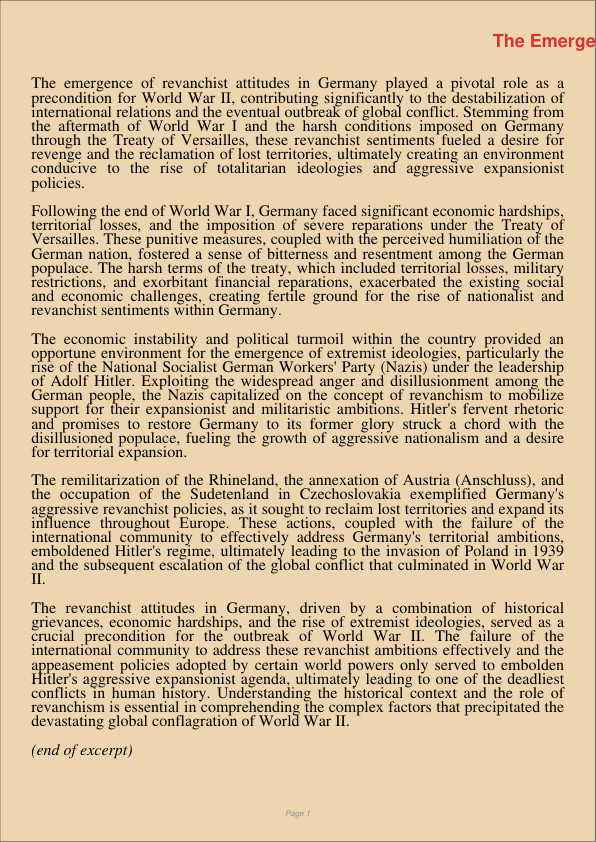The Emergence Of Revanchist Attitudes In Germany As A Precondition For The World War 2
Jan 9, 2024
world war 2
revanchist attitudes
Human Resources
Religion and Theology
The emergence of revanchist attitudes in Germany played a pivotal role as a precondition for World War II, contributing significantly to the destabilization of international relations and the eventual outbreak of global conflict. Stemming from the aftermath of World War I and the harsh conditions imposed on Germany through the Treaty of Versailles, these revanchist sentiments fueled a desire for revenge and the reclamation of lost territories, ultimately creating an environment conducive to the rise of totalitarian ideologies and aggressive expansionist policies.
Following the end of World War I, Germany faced significant economic hardships, territorial losses, and the imposition of severe reparations under the Treaty of Versailles. These punitive measures, coupled with the perceived humiliation of the German nation, fostered a sense of bitterness and resentment among the German populace. The harsh terms of the treaty, which included territorial losses, military restrictions, and exorbitant financial reparations, exacerbated the existing social and economic challenges, creating fertile ground for the rise of nationalist and revanchist sentiments within Germany.
The economic instability and political turmoil within the country provided an opportune environment for the emergence of extremist ideologies, particularly the rise of the National Socialist German Workers’ Party (Nazis) under the leadership of Adolf Hitler. Exploiting the widespread anger and disillusionment among the German people, the Nazis capitalized on the concept of revanchism to mobilize support for their expansionist and militaristic ambitions. Hitler’s fervent rhetoric and promises to restore Germany to its former glory struck a chord with the disillusioned populace, fueling the growth of aggressive nationalism and a desire for territorial expansion.
The remilitarization of the Rhineland, the annexation of Austria (Anschluss), and the occupation of the Sudetenland in Czechoslovakia exemplified Germany’s aggressive revanchist policies, as it sought to reclaim lost territories and expand its influence throughout Europe. These actions, coupled with the failure of the international community to effectively address Germany’s territorial ambitions, emboldened Hitler’s regime, ultimately leading to the invasion of Poland in 1939 and the subsequent escalation of the global conflict that culminated in World War II.
The revanchist attitudes in Germany, driven by a combination of historical grievances, economic hardships, and the rise of extremist ideologies, served as a crucial precondition for the outbreak of World War II. The failure of the international community to address these revanchist ambitions effectively and the appeasement policies adopted by certain world powers only served to embolden Hitler’s aggressive expansionist agenda, ultimately leading to one of the deadliest conflicts in human history. Understanding the historical context and the role of revanchism is essential in comprehending the complex factors that precipitated the devastating global conflagration of World War II.
